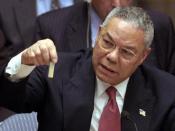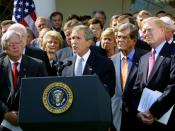Throughout time, the question of whether such a heinous act as war can be considered 'just' has been the issue for debate to this very day. The theory which has been given rise to appraise the legality and ultimately justifiability of armed conflict is termed just war theory. This essay draws on just war theory to calculate whether the resolution by the United States administration to attack and subsequently invade Iraq in 2003 had just cause. This thesis will start with a brief, broad-spectrum summary of just war theory, and will definitively connote that the US lead incursion does not meet the required criterion.
Just war theory draws on a vast array of various disciplines. Regardless of the vast array of differing sources and chronological expansion, though, just war theory has a few frequently documented essentials. These essentials tend to be customarily grouped into two dissimilar but interconnected areas of interest.
The first, titled jus in bello, attempted to institute a rule based system, designed for the demeanour and conduct of both combatants and non-combatants of war after it had commenced and focused on such issues as "the management of prisoners, the utilisations of toxins, requisition of property, and the use of destructive weaponry" (Holmes 1992, 201). The second, jus ad bellum, was to "institute rules governing resorting to war, and to encapsulate circumstances under which war could justifiably be fought" (Holmes 1992, 201). Given the focus and breadth of this essay, analysis will be restricted to this second theme, to the jus ad bellum section.
Preston usefully divides this jus ad bellum into six distinctive stipulations: "the cause being just, the 'right' power to go to war, the right intentions, war as the last possible options, aims must expect budding peace, and finally that war must be proportionate" (Preston...


